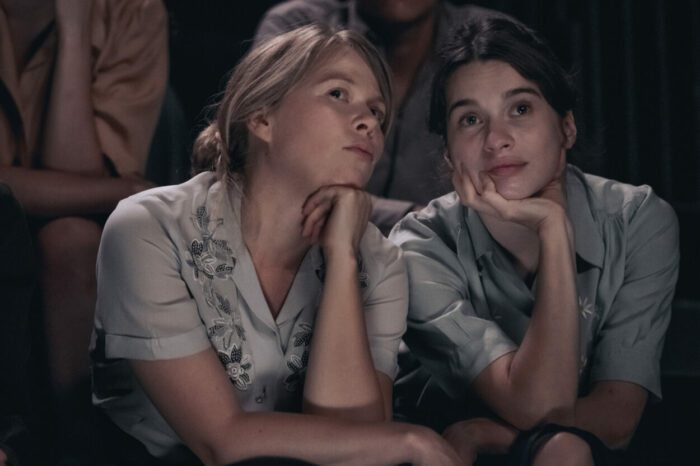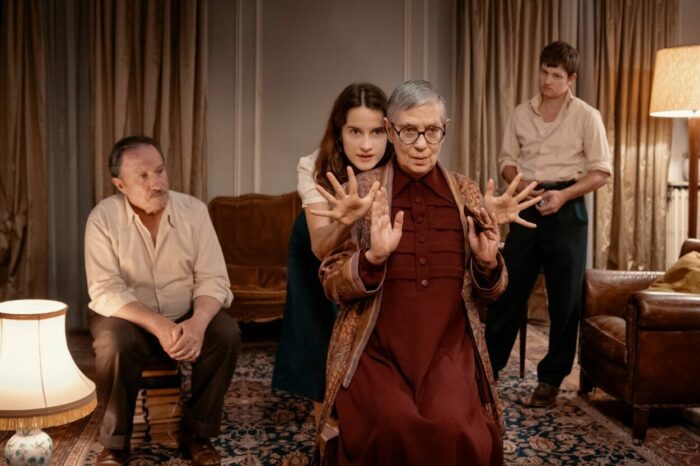A Radiant Girl—originally titled in French Une Jeune Fille qui va bien or “A Young Girl Who Is Doing Fine”—is aptly titled in English, for it could not be any more dependent upon the performance of its star Rebecca Marder and her character Irène’s charisma. Or, if you prefer, her “radiance.” Marder’s is without doubt an ebullient performance as an aspiring young actress in Sandrine Kiberlain’s drama set during the Nazi occupation of France in 1942.
A Radiant Girl marks Kiberlain’s feature debut as a writer-director: one of France’s most prolific and versatile stars since her 1995 debut in To Have (Or Not), she has received nine César nominations and won two César Awards. For her first effort behind the camera, she turns to The Diary of Anne Frank and to a reimagining of her own family history—both her grandmother’s during WWII and her own in later years as an aspiring actress herself—for inspiration. The result is not a memoir, per se, but rather an evocatively imagined historical fiction with roots in Kiberlain and her family’s lived experience.

Kiberlain’s protagonist, 19-year-old Irène (Marder), is a young drama student immersed in the theatrical arts, honing her passion and rehearsing for an entrance exam as she hopes to earn a coveted position at a prestigious arts conservatory. When not rehearsing, her life is full of the passions and pursuits of youth: making friends, flirting with boys (and young men), antagonizing her little brother, and spending time with her close-knit family.
At home, Irène’s boundless exuberance tests the patience of her family, including her quiet, reserved father André (André Marcon), doting grandmother Marceline (Françoise Widhoff), and younger flautist brother Igor (Anthony Bajon). In most ways, young Irène’s life could hardly be better, each day a frothy cocktail of performances, flirtations, and aspirations.

Yet at the margins there are—as one should expect in a drama set in the Nazi Occupation of France—dark clouds on the horizon. Irène’s breathless enthusiasm has resulted in some increasingly worrisome fainting spells, for one, that necessitate a series of doctor’s visits. For another, her secular Jewish family has begun to absorb the first few impacts of the Germans’ rule, including a law that requires their carrying ID card stamped in red with a loud marker of their Jewishness.
Despite these, the family and Irène in particular carry on, largely without concern for the growing storm of Fascism outside their stoop. Kiberlain’s script and direction, as it partly inspired by her own family story, focuses almost exclusively on Irène’s coming of age. While Marder’s performance has earned plenty of acclaim, including a César nomination for Best Female Newcomer (the same award that jump-started Kiberlain’s acting career), the degree to which any viewer appreciates A Radiant Girl will depend largely upon their fondness for her Irène. Many will find, and many have found, her charm delightfully irrepressible; others will find her simply exhausting, a non-stop and borderline narcissistic parade of eccentricities, schemes, and delusions.

Viewers with the benefit of the hindsight of history know what Irène does not. In this sense A Radiant Girl is not at all a traditional Holocaust narrative, but instead a coming-of-age tale exploring the freedoms of youth while a world changes rapidly largely to the ignorance of its protagonist. This approach of Kiberlain’s is novel, for certain. The opening scenes of Irène’s rehearsals are absent any reference to the outside world and might be set, for all one can discern, in modern-day Paris. Hairstyles and wardrobe do not explicitly denote the film as a period piece, and its music ranges from the traditional to the quirkily anachronistic (Tom Waits, Metronomy). That’s an intentional choice that connects the past to the present.
If Irène’s obliviousness to the threat of Nazism is part of her supposed charm, it’s also the design of Kiberlain’s script. There are none of the overt threats of the ruthless Gestapo but instead quiety, increasingly problematic signs of the regime’s first steps towards their “final solution”: first intimated in quiet asides kept secret from Irène, then more tangible as the family surrenders a radio, bicycle, their telephone (all potential vehicles of communication or flight). Then, the yellow star on their clothes and the red mark on their identification cards. But with the narrative so focused on Irène’s teen dramas of romantic ruses and crushes, there seems to be little time for any tangible visual evidence of the actual occupation of Paris by the Germans.
Obviously, this approach is all intentional on Kiberlain’s behalf. Hers is a drama of a young and “radiant” girl set in the path of the Holocaust, not a traditional Holocaust drama in which a protagonist is unwillingly but knowingly caught. The result is that one has to enjoy being immersed in Irène’s drama of fake nearsightedness and other contrivances while much more worrisome events take place outside her knowledge. Given the film’s rapturous critical reception to date, it’s clear many find Irène’s drama compelling.
For those who do, Marder’s performance deserves plenty of credit. She is onscreen for nearly the entirety of the film’s running time and tasked with delivering lines and actions that range from the occasionally insightful to the often endearing and not infrequently perplexing. It’s a role few actors could sell, and Marder gives the role her all. If, as A Radiant Girl’s press notes suggest, moments of beauty are possible even under the hardest of circumstances, Marder’s performance is crucial to that theme. And there, Kiberlain’s film finds its surest footing as a coming-of-age tale warning that the crimes of the past are never all that far from our present.
Film Movement presents A Radiant Girl, written and directed by Sandrine Kiberlain and starring Rebecca Marder, opening exclusively in theaters in New York (Quad Cinema) on Friday, February 17, 2023, followed by a national release.



